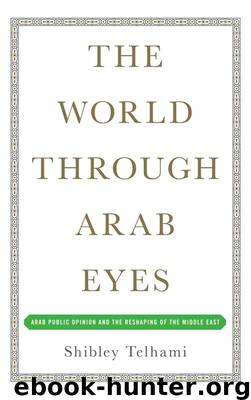The World Through Arab Eyes by Shibley Telhami

Author:Shibley Telhami
Language: eng
Format: mobi
Publisher: Basic Books
Published: 2013-06-23T20:13:13+00:00
FIGURE 7.4 Unfavorable Arab Ratings of the United States, Without Regard to Satellite TV Access, Six-Country Aggregates, 2009–2011
By May 2012, Egypt was already providing evidence that the 2011 improvement might have been temporary. In a poll taken on the eve of the Egyptian elections, 85 percent of those surveyed expressed unfavorable views of the United States. Part of the reason was a widespread perception that the United States would be intervening (through the Egyptian military) to prevent a democratically elected president from taking office or even being announced, but the Egyptian results were also consistent with prior trends. Ironically, of course, the United States actually tried to persuade the Egyptian military to accept whatever outcome emerged from the democratic vote, and when the Muslim Brotherhood’s candidate, Muhammad Morsi, was declared the winner, former allies of Washington in Egypt turned the tables and started accusing the Muslim Brotherhood of being America’s candidate. Thus, when Egyptians were in the middle of what was mostly an internal struggle, deeply held anger with the United States was an instrument used to gain advantage by those previously friendly to Washington (remnants of the Mubarak regime) against those previously hostile to it (especially Muslim Brotherhood). As the old saying goes, politics makes for strange bedfellows.
It Was Never About Values
Arab attitudes toward the United States were never at their core about values as such. It is true that “values” cannot be easily separated from policy, but opinions Arabs form about American values are based on policies, not slogans. Yes, Arabs admire the stated values of freedom and democracy, but their assessments of what America in fact stands for are formed by observing American policies and their consequences for Arabs themselves. It isn’t that Arabs say, “We don’t like American values; therefore we reject American policies.” It is the opposite: They reject American policies and therefore question American values and whether America stands for what it professes. From Woodrow Wilson’s time, America has championed self-determination, and that has long found resonance in the Arab world. But how does that square with America’s seeming acceptance of Palestinians living under occupation? America champions freedom and democracy, but how does one reconcile that with U.S. support for Arab autocrats who repress their people?
FIGURE 7.5 Basis of Arab Attitudes Toward the United States, Six-Country Totals, 2004–2008
Download
This site does not store any files on its server. We only index and link to content provided by other sites. Please contact the content providers to delete copyright contents if any and email us, we'll remove relevant links or contents immediately.
| Anarchism | Communism & Socialism |
| Conservatism & Liberalism | Democracy |
| Fascism | Libertarianism |
| Nationalism | Radicalism |
| Utopian |
The Secret History by Donna Tartt(16723)
The Social Justice Warrior Handbook by Lisa De Pasquale(11506)
Thirteen Reasons Why by Jay Asher(7833)
This Is How You Lose Her by Junot Diaz(5829)
Weapons of Math Destruction by Cathy O'Neil(5080)
Zero to One by Peter Thiel(4867)
The Myth of the Strong Leader by Archie Brown(4809)
Promise Me, Dad by Joe Biden(4478)
Beartown by Fredrik Backman(4465)
How Democracies Die by Steven Levitsky & Daniel Ziblatt(4448)
Stone's Rules by Roger Stone(4438)
The Fire Next Time by James Baldwin(4373)
100 Deadly Skills by Clint Emerson(4108)
A Higher Loyalty: Truth, Lies, and Leadership by James Comey(4059)
Rise and Kill First by Ronen Bergman(4045)
The David Icke Guide to the Global Conspiracy (and how to end it) by David Icke(3913)
The Farm by Tom Rob Smith(3895)
Secrecy World by Jake Bernstein(3808)
The Doomsday Machine by Daniel Ellsberg(3758)
